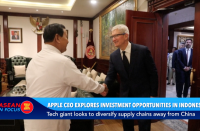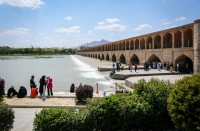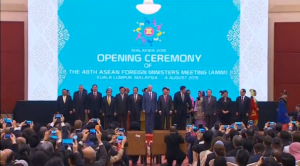
(Reuters) — Malaysia urged partners from Southeast Asia to unite and look into an “amicable” settlement on the territorial dispute with China as foreign ministers of the regional bloc meet for three-day talks in Malaysia on Tuesday (August 4).
In the opening ceremony attended by all Association of Southeast Asia Nations (ASEAN) ministers and foreign dignitaries like Turkish Foreign Minister Mevlut Cavusoglu, who was in the country for a state visit, Malaysia Foreign Minister Anifah Aman called out to his ASEAN partners to look for a way for peaceful resolution of the territorial dispute.
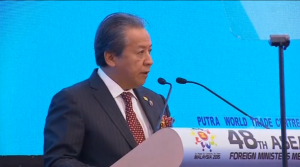
“The issue of South China Sea is a prime example. ASEAN can and should play a vital part in effecting the amicable settlement. One that respects the dignity of each nation. Above all, we must be seen to address these issues peacefully and cooperatively. We have made a positive start but we need to do more. Let this be the day we say we will do more,” said Anifah at the opening ceremony attended by the foreign ministers and other dignitaries.
China claims most of the South China Sea, through which $5 trillion in ship-borne trade passes every year, and rejects the rival claims of Vietnam, the Philippines, Brunei, Malaysia and Taiwan.
The issue was not on the official agenda, but expectations were high that it would be discussed against a backdrop of increasing tensions and overlapping claims in the potentially energy-rich South China Sea.
Chinese Vice Foreign Minister Liu Zhenmin who attended a senior officials meeting on Monday (August 3) said that the dispute should not be discussed at a regional meeting.
The meeting in Kuala Lumpur will be attended by foreign ministers from 10 ASEAN nations and its dialogue partners including China and the United States.
The regional bloc is set to form an integrated economy by the end of this year, a market body will eliminate non-tariff barriers and remove obstacles to labor flows in the region of 600 million people.
The goal of creating an ASEAN Economy Community (AEC) by the end of 2015 was set back in 2007.
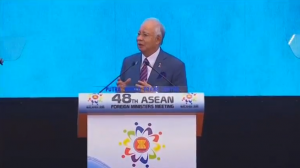
Speaking to the foreign ministers as he officiate the opening ceremony, Malaysian Prime Minister Najib Razak urged the region to play a pro-active role as it could be the world’s fourth largest market.
“An increasingly integrated ASEAN is on course to be the world’s fourth largest economy by 2050. Some even estimate that we could be the fourth-largest market after EU, US and China by 2030, only 15 years from now. We already have the third biggest workforce, after India and China, and it is entirely realistic for us to see ourselves as a strong “Third Force” in Asia,” said Naijb.
The region has certainly shown potential to be a major market, particularly considering data has shown Foreign Direct Investment (FDI) in ASEAN to have outpaced that in China in 2014.
Founded in 1967 in the midst of Cold War conflicts, insurgencies and coups in Southeast Asia, ASEAN has become the region’s most successful grouping, credited with preventing strife and promoting a surge in trade and investment.

